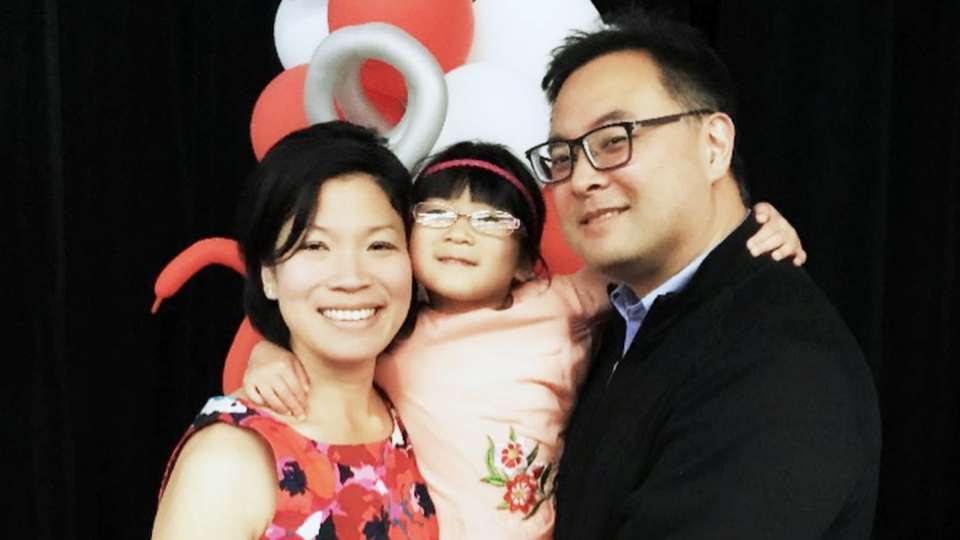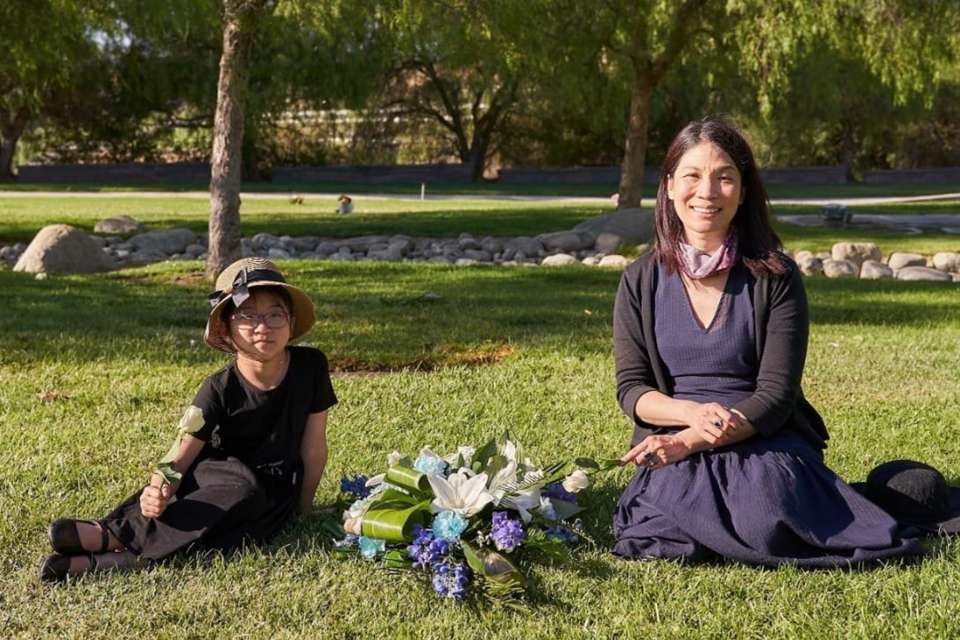
It was a normal Wednesday for Annie Kuo until she received an alarming text from her 49-year-old husband, Victor, in the emergency room. When Annie arrived at the ER, she learned Victor was having a cardiac event, which escalated into a heart attack the next day. After an unsuccessful stent procedure and five days on life support, Victor suffered a hemorrhagic stroke. He died on June 18, 2020. Months later, as Annie was going through Victor’s things, she made a shocking discovery. This is her story, as told to Angela Cabotaje.
Love at second sight
Victor and I first met as children. Six years apart in age, we didn’t have much in common at the time, but when we were reintroduced many years later as young professionals, we hit it off. We had become student activists and shared values of faith, hospitality and social justice.
We got married in 2004. Eight years later, we became parents to our one and only child, Vivian, who is 9.
Victor was an educator who pursued a career in philanthropy and social impact evaluation. He had the kind of heart that was very giving. He was compassionate, gentle and kind. But he was also very reserved, frequently dysphoric after job changes and very private. There was a lot that Victor kept to himself.
Living with diabetes
When we started dating, Victor admitted he had developed poor eating habits and a sedentary lifestyle while completing his dissertation.
Then in his mid-30s, three years into our marriage, Victor was diagnosed with Type 2 diabetes. We went to a diabetes management class together just weeks before I moved away to grad school for a year.
We got this big binder of information from that class, and I remember thinking, “Wow, this is a lot.”
I said to him, “I’m so sorry I’m going away. Are you going to be OK? Because there’s a lot to monitor with diabetes.”
Victor was very responsible and meticulous, and said he would be fine. He seemed to always have it together, so I just trusted him. I never wanted to be a nagging wife, but when I returned from grad school, he was clearly in denial.
Eventually, he started insulin injections and slimmed down. He became very dedicated to his exercise routine. Every morning for six years, he went for a swim before work.
I inquired about his shots when I stopped seeing his insulin on the kitchen counter. Victor said that his doctor was allowing him a break.

A normal Wednesday
Victor’s last day at home was also Vivian’s last day of second grade. In the late afternoon, I dropped Vivian off at her friend’s house for a sleepover, and when I came back, Victor wasn’t home.
Over a series of texts, I learned that he had gone to the emergency room for shortness of breath. When I got to the ER, Victor told me and the attending physician that he had been doing yard work on Sunday when he heard a crack from his lung area and felt winded.
I didn’t know that detail, but I remembered seeing Victor sprawled out on the couch that Sunday. When I asked him if he was OK, he said he was just feeling winded from yard work and that it would be fine. The next couple of days, everything did seem fine. Even that morning, he was upbeat.
Victor was admitted to UW Medical Center – Northwest that night, and his blood sugar levels were through the roof. The doctors said he had diabetic ketoacidosis from insufficient insulin in his body, which is very dangerous.
Why did this happen?
The next morning the care team took Victor to the catheterization lab for an angioplasty. They anticipated that he would need a stent procedure or, alternatively, double bypass surgery. Then one of the doctors came to me and said, “Your husband is having a heart attack right now.”
They were concerned a double bypass would shock his system. So they decided to transfer him to UW Medical Center – Montlake, where he would have every treatment option.
At Montlake, they gave Victor three stents, but after three hours, his heart muscles were still very weak on the left side, which is where blood is received from the lungs and pumped to the body. Suddenly, they were talking to me about life support machines and the possible need for a heart transplant.
I was completely shocked because this was Victor’s first heart attack and doctors were originally telling me a week of recovery from the stents.
They put him in twilight sleep for three days and on a heart-lung machine called ECMO to allow his heart time to rest, heal and hopefully strengthen. When Victor came to, they saw that he was making a promising recovery and may no longer need a heart transplant. The doctors said it would just be a few weeks before we could leave the ICU.
After Victor was extubated, he could talk to us over a couple days, so we were able to say, “I love you.” Those were our last words to each other, and the night nurse who was with him said he spoke fondly of his wife, daughter and job helping underrepresented students.
I was completely blindsided the next morning when Victor had a hemorrhagic stroke, a risk of ECMO treatment. During emergency brain surgery, the doctors couldn’t stop the bleeding. They told our family that he would be paralyzed, blind and would never open his eyes or talk to us again.
My husband of 16 years died in my arms, with his sister holding his hand. I really appreciate the UW Medicine surgical team for letting me hold him in his final moments.
But he was 49 years old. Why did this happen?
A shocking discovery
A few weeks ago, I was going through papers in his home office and came across his health folder. That’s when I found out that he had been diagnosed with clinical depression but had declined treatment. I also found out that he had a pattern of noncompliance with diabetes care.
I was blown away because Victor was very diligent and regulated in every other aspect of his life.
His doctor’s office warned him that, as a young man, diabetes was a serious disease and offered to connect him with a diabetes management program for busy people.
Victor eventually got on track with blood pressure monitoring, insulin shots, diet and exercise. Then his doctor allowed him a break from insulin, which he gladly took.
The standard of diabetes care is apparently to follow up in three months, but that three-month period turned into two years. Victor and I were busy adjusting to Vivian’s new school and my new job during that time. We learned in the ER that his doctor moved to a different clinic and he never replaced her.
I called the psychiatrist named in his files and learned he went on the recommendation of his primary care provider in 2012, just before Vivian turned 1. The psychiatrist diagnosed him with major depression and recommended a combo of medication and psychotherapy. He immediately declined the drugs and said he’d think about the therapy, but she never heard from him again.
After that, I did some research and learned that depression and diabetes are closely linked, almost like a cause and effect. The rigors of managing diabetes can lead to depression, and depression can adversely affect someone’s self-care. If you’re diagnosed with depression or diabetes, you’re at an increased risk of developing the other condition. But if you effectively manage one, it can have a positive effect on the other. On the flipside, uncontrolled diabetes and untreated depression can be a life-threatening combination.
A wake-up call
There are so many things I wish I could ask Victor.
Did he give up on controlling his diabetes or think he could beat it through exercise alone? I suspect those early morning swims made him feel good and, though he slept a lot, I connected it with fatigue and not depression. Now I think it was both. I’ve learned that major depression can develop into persistent depressive disorder if left untreated.
Culturally, there was likely a stigma ingrained in him about mental health issues. I wish he had known that depression is not a weakness of character or a lack of mental strength, but often a genetic predisposition compounded by life stressors. I wish that he had shared his diagnosis with loved ones. Like diabetes, depression is a real and serious health condition that can impact your life and people who care about you.
When I called my primary care doctor after Victor’s death, I found out that I haven’t seen her in three years. That was a real wake-up call. I realized that it’s so easy to get busy and overlook our health, taking for granted that we’re fine.
What I’ve learned is that our mental health, our physical health and our emotional health are all tied together. I’d say to anyone who is in denial about their diabetes, or who has depressive symptoms, to get help right away while the condition is still treatable and before it gets worse.
We need to play an active role in caring for ourselves and our loved ones. I miss Victor, and I want to continue his legacy of service to others. Hopefully sharing his story can help someone else.

Learn more about diabetes and depression
If you’ve been diagnosed with diabetes or depression, it’s important to seek help from a healthcare professional.
“With my patients with diabetes, you do see a lot of mental health struggles,” says Dr. Tracy Tylee, who sees patients at the Endocrinology/Diabetes Clinic at Harborview Medical Center. “It’s unique among chronic illnesses in that the burden of management is on the patient.”
Tracking your diet, figuring out how much you need to exercise and testing your blood sugars day in and day out can be exhausting, she adds.
“Your diabetes management affects everything you do,” Tylee notes. “It’s very common to have a link between diabetes and depression — it’s called diabetes burnout — and it can cause you to want to just stop treatment.”
Of course, avoiding treatment can lead to other serious health concerns and increase your risk of heart disease and stroke. To avoid getting caught in this cycle, Tylee says all patients should find a doctor they feel comfortable with and who they can trust.
“Our job as healthcare providers is to work with patients to meet them where they are and help them find a regimen that works for both their mental state and their diabetes,” she explains. “At the Diabetes Institute, we have a psychiatrist and a psychologist who are in our clinic because we know that it’s common to have a link. It’s there — we just have to recognize it.”

 Healthy ideas for your inbox
Healthy ideas for your inbox





